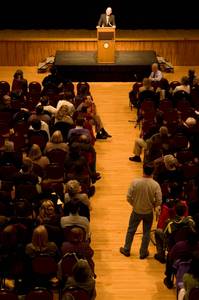This exchange is excerpted from a public forum last April that introduced UO’s new president Richard Lariviere to the UO community:
 IAN MCNEELY: I am a professor of history and I knew your work on Dharmas´a stra before I even knew you were an administrator. My question is this — you were quoted in the Register Guard this morning as saying that, “The humanities will not die,” and indeed all of us find it hard to imagine that a millennial-old tradition could either come to an end or wither into insignificance. Some would say that is exactly what happened with the Sanskritic tradition — when Europeans arrived and began prizing practical, utilitarian, scientific knowledge. So my question is, how would you draw upon your lessons from your days as a Sanskritist in order to confront the so-called crisis of the humanities in our own times?
IAN MCNEELY: I am a professor of history and I knew your work on Dharmas´a stra before I even knew you were an administrator. My question is this — you were quoted in the Register Guard this morning as saying that, “The humanities will not die,” and indeed all of us find it hard to imagine that a millennial-old tradition could either come to an end or wither into insignificance. Some would say that is exactly what happened with the Sanskritic tradition — when Europeans arrived and began prizing practical, utilitarian, scientific knowledge. So my question is, how would you draw upon your lessons from your days as a Sanskritist in order to confront the so-called crisis of the humanities in our own times?
RICHARD LARIVIERE: Boy, that is really provocative. I’m not sure that it is a fair characterization — that the Sanskrit tradition died or met the beginning of its demise with the arrival of the Europeans in South Asia. It continued pretty robustly for an additional 100 years and it has never died, but it has become moribund, effectively. It is very hard to find a traditionally trained pundit who is under the age of 85. They tend not to be scholars but repositories of the tradition.
I think a lot of the responsibility for that lies with the Hindu community, which has ceased to value this learning. Traditional Indian pundits are not unlike, well, professors of Sanskrit; they really are at the mercy of the largesse of the communities in which they live because there isn’t a commercial application for it. It is really just the love of the learning that supports it. I have been generously and wonderfully supported by federal agencies, private donors, etc. to do my work. But in India there was a period of time, which I think extends nearly up to this day, in which people just didn’t think that kind of research, that kind of knowledge, was important anymore. And so they neglected it and allowed it to just drift away. There is some movement to revive it today but it is not very effective. And India doesn’t have the tradition of private philanthropy to support scholarly activity in the same way that we do in the United States.
How does that parallel with the humanities? I think there are some significant parallels in that people have ceased to value humanistic study because its utility is not immediately apparent. The discourse about what universities do is almost exclusively focused on the utility of the inquiry that is going on. [When this topic came up yesterday], this is where I said that humanists are really kind of to blame for this, in some sense. My wife is trained as a microbiologist, worked in a lab in Thomas Jefferson Hospital when I was a graduate student, and I was always impressed with the fact that they were working on something technical and abstruse and incomprehensible to the layman — but if you asked them, as a layman, what they were doing, they would respond, “Oh, cancer research.”
Now I came away from that conversation reassured and confident a) that I understood what they were doing and b) that it was important. You talk to a humanist about what they are doing — and I am as guilty of this as any of the rest of the humanists in the audience — we tend to immediately get down into the weeds of what it is that we are looking at. The poor interlocutor has just asked that question, just wanted to know what Sanskrit is, and suddenly I’m talking about Raghunandana Bhattacharya's relationship to the Navya-Nyaya tradition. You can immediately see the curtains come down and you have lost your audience.
We don’t do a very good job ourselves, and certainly not in training our graduate students, to explain why studying this topic is of any consequence to anybody. And good Lord, it is. The reason I am so confident that the humanities are never going to die is because it is the one topic that is more important to everybody than anything else — that is, “Who am I and what does my life mean?” That is what humanists engage all the time.
It’s an incredibly complex arena of investigation, and it’s all the more important for us as humanists to give people landmarks to help make sense of what it is that we are doing. I place the blame for the demise of Sanskrit on the people who didn’t understand the value of that tradition and I place the demise of the humanities’ “esteem” (it used to be much more central at universities than it is now) largely at the feet of those of us who have failed to make the case for them. And I can say that with some confidence because I am as guilty as you are of that.


 Watch Ian McNeely's talk at Google, Inc. and read a chapter from his book, Reinventing Knowledge.
Watch Ian McNeely's talk at Google, Inc. and read a chapter from his book, Reinventing Knowledge.